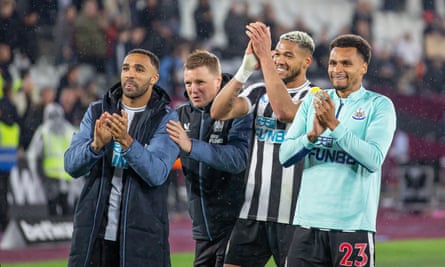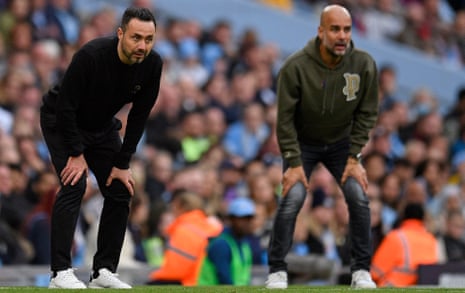Roberto De Zerbi (Brighton)
This selection – alphabetically first but meritocratically last – could just as easily have been Mikel Arteta, Steve Cooper, Thomas Frank or Erik ten Hag. But De Zerbi carries it, and with good reason. Ordinarily, arriving after the start of the season would be enough to rule him out of lists such as this, but strangely, in this case it fortifies his position in it. His appointment in September left him plenty of time to work, but more than that, the manner in which he has inculcated a style change in between matches, most particularly solving a goalscoring problem that has dogged Brighton for years, make him impossible to leave out. Watching Brighton at any point during any game, it’s clear that the players know their jobs as individuals and a collective and stick to them in all circumstances against every opponent. On the face of things, this looks a brave plan – different opponents have different strengths and weaknesses – but in reality it makes perfect sense, because De Zerbi formulated it.
Pep Guardiola (Manchester City)
We can’t fete Pep Guardiola without noting that every team he’s ever managed has had the best players in its league, but his ability to extract the most from elite-level players is sensational – they know if they sign for him they will improve and win. In the early part of this season, it looked like the obsessiveness which drives that process was beginning to grate on them, but that is forgotten now, a tactical innovation pushing the game on and leaving the rest rummaging for an antidote. It is not unamusing that this move to three at the back involved the penetrating realisation that defenders who can defend are useful, but four attacking midfielders behind Erling Haaland, with two technical, powerful holders pushing up behind them, is no joke whatsoever.
Eddie Howe (Newcastle)
In August, Newcastle and Manchester City drew 3-3 in a match that remains one of the season’s best, and it was that afternoon Newcastle established themselves as a force, tearing about the pitch with intensity, invention and intelligence. It is fair to say that Bruno Guimarães and Alexander Isak are just good players, the best available to Howe at this point and at the club because of the change in circumstance more than the change in manager. But it is Howe who has drilled one of the league’s meanest defences, Howe, who is responsible for some of its most egregious gamesmanship, and Howe who converted Joelinton from punchline striker to midfield machine. It’s hard to imagine anyone could have done a better job, not even Guardiola, and there’s no higher praise than that.

Gary O’Neil (Bournemouth)
“I feel sorry for the fans, I feel sorry for the players, to be honest with you, because at the moment we are just a bit underequipped at this level.” So said Scott E. Parker after Bournemouth were hammered 9-0 at Anfield – a result several orders of magnitude better than his cardigan – and he was sacked shortly afterwards. And though it feels strange to start a manager’s entry with a quotation from his predecessor, it tells us plenty about the situation Gary O’Neil walked into: no one thought Bournemouth had a chance of staying up, not even the bloke handsomely rewarded to make it happen. O’Neil, though, thought differently, settling into his first appointment with two wins and four draws, first stabilising his defence, then doing just enough with the attack to ensure his team stayed up comfortably. “The levels” were not, as Parker thought, “far too big” – and O’Neil is the reason why.
after newsletter promotion
Marco Silva (Fulham)
Before the season started, there was no reason to think Fulham might stay up, but now a quick look at the relegation battle appears to explain why they have: none of Leicester, Everton and Leeds should really be involved, given the quality they have. Except Marco Silva’s men have neither spent nor ended the season hovering just above them, their safety in no way predicated on felicitous failures elsewhere. Rather, they began with a creditable draw against Liverpool and continued in that vein until the end. Even in defeat, Fulham have performed – of their 16 league defeats, only three have been by more than one goal – thanks largely to Silva’s organisation and mentality. He was helped by excellent decisions in the transfer market, his midfield revitalised by the cheap acquisitions of Andreas Pereira and, in particular, João Palhinha, while Bernd Leno, Willian and Issa Diop have also been big successes. The challenge now is to keep it going.

Comments (…)
Sign in or create your Guardian account to join the discussion